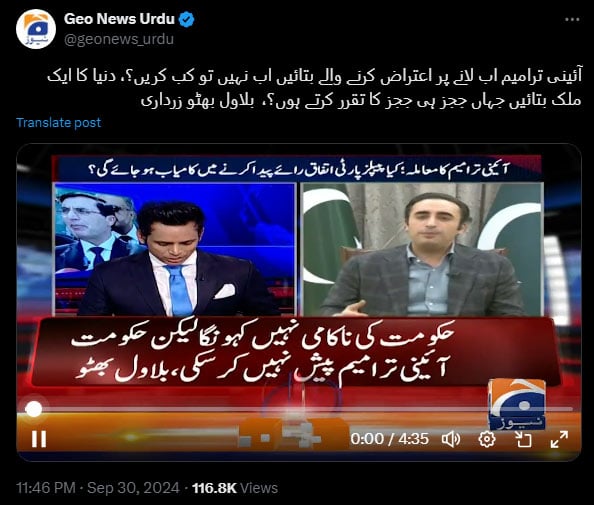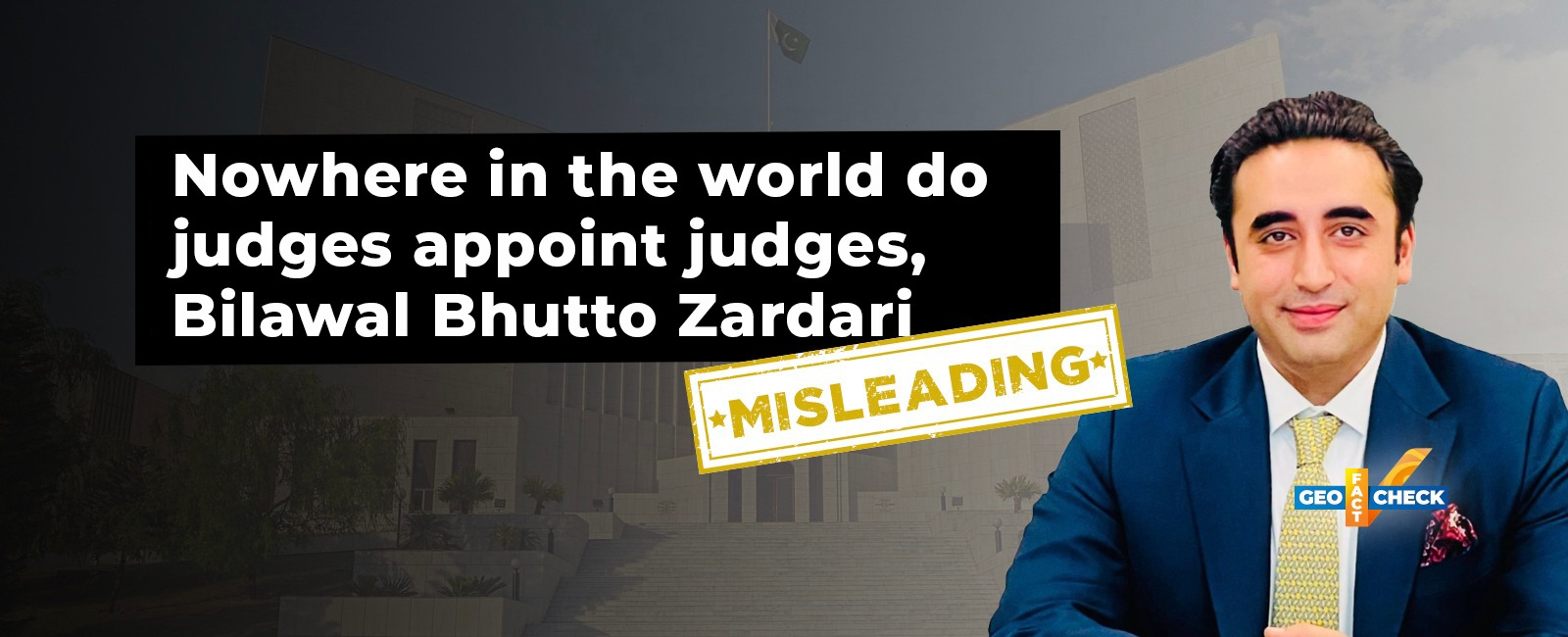Fact-check: No country in the world where judges appoint other judges?
In India, while judges do not directly appoint judges to higher judiciary, they have significant influence over appointments

Prior to and following the approval of the 26th Amendment to Pakistan’s Constitution, which grants legislators greater power in selecting judges, Pakistan Peoples Party (PPP) Chairman Bilawal Bhutto Zardari-has repeatedly suggested in television interviews that there is no country in the world where judges appoint other judges to the higher judiciary.
The claim is misleading.
Claim
On September 30, during an interview with Geo News, Bilawal challenged the host of the show to name a country where judges appoint other judges.
"Give me the example of one country in the world where the appointment of judiciary is done by the judges, for the judges, and of the judges?" he questioned.

On October 8, in an interview with Dunya News, Bilawal reiterated his claim: "It is only within Pakistan where judges themselves choose judges, creating a judiciary of the judiciary, by the judiciary, and for the judiciary."

More recently, while speaking to BBC Urdu, Bilawal posed a question similar to the host's, asking for an example of a country where "judges appoint a judge and where judges remove a judge." When the journalist mentioned India, Bilawal said the example only "applies to the seniority principle".
"But what is the appointment process in India? …There isn’t a single country where judges appoint a judge and judges remove a judge," he later said.
Similarly in an interview with ARY News, he stated: "I have not seen this anywhere in the world where judges appoint other judges."
The statement led some social media users to believe the claim to be accurate.
Fact
The claim is misleading. In India, while judges do not directly appoint judges to the higher judiciary, they have a significant influence over appointments, while the executive acts as only a nominal appointing authority.
Talha Abdul Rahman, a Supreme Court lawyer in India, explained to Geo Fact Check in a written response that the judges of India’s top court are appointed by the president in consultation with the chief justice and other senior judges.
"This process is guided by the recommendations of a collegium system, consisting of the chief justice of India and the four senior-most judges of the Supreme Court," he stated. He explained that the collegium evaluates potential candidates based on merit, integrity, and experience.
"Some of the recommendations of the collegium are on the website of the Supreme Court of India, which are now being published to bring out greater transparency," Rahman said.
Rahman further added that theoretically, the government can request reconsideration of a judge’s appointment and return the recommendation to the collegium. However, if the collegium reiterates the recommendation, the government is "bound to act on the recommendation", he said.
Regarding the appointment of the chief justice of India, Rahman explained that the convention is to appoint the senior-most judge of the Supreme Court as the chief justice. "This practice has been followed to maintain the independence and integrity of the judiciary. The outgoing chief justice often recommends their successor to the president."
A similar collegium system is used for the appointment of high court judges in India. The chief justice of the high court and two senior-most judges forward recommendations to the Supreme Court’s collegium.
"Previously, the seniority of the high court judges was an important criteria, but the last couple of years indicate that while seniority is a relevant consideration, it is not such a serious consideration" when appointing judges to high courts, Rahman said.
He then added that in his opinion while the collegium system has its limitations, the government "being the largest litigator in courts should not have towering influence" on appointment of judges.
The articles of India’s constitution, governing the appointment of judges can be found on the website of India’s Department of Justice here.
Separately, Salahuddin Ahmed, a Pakistani lawyer, explained to Geo Fact Check that while democracies have various systems for appointing judges, in neighboring India, the senior-most judges of the Supreme Court do nominate judges, with the government only issuing a formal notification.
Ahmed also clarified that it was incorrect to imply that prior to the 26th Amendment, only judges appointed judges in Pakistan.
Since the 18th and 19th Amendments, judicial appointments were made by a judicial commission, which included representatives from both the government and the judiciary, he explained. The names were then forwarded to a parliamentary committee comprising members from the treasury and the opposition.
"Now the balance in the [new] judicial commission has been tilted in the favor of the government," Ahmed said.
Follow us on @GeoFactCheck on X (Twitter) and @geo_factcheck on Instagram. If our readers detect any errors, we encourage them to contact us at [email protected]





